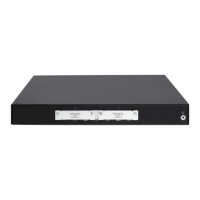6
To enable dynamic ARP entry check:
Step Command Remarks
1. Enter system view.
system-view
N/A
2. Enable dynamic ARP entry
check.
arp check enable
By default, dynamic ARP entry check is
enabled.
Enabling ARP logging
This feature enables a device to log ARP events when ARP cannot resolve IP addresses correctly.
The device can log the following ARP events:
• On a proxy ARP-disabled interface, the target IP address of a received ARP packet is not one of
the following IP addresses:
{ The IP address of the receiving interface.
{ The virtual IP address of the VRRP group.
{ The public IP address after NAT.
• The sender IP address of a received ARP reply conflicts with one of the following IP addresses:
{ The IP address of the receiving interface.
{ The virtual IP address of the VRRP group.
{ The public IP address after NAT.
The device sends ARP log messages to the information center. You can use the info-center source
command to specify the log output rules for the information center. For more information about
information center, see Network Management and Monitoring Configuration Guide.
To enable the ARP logging feature:
Step Command Remarks
1. Enter system view.
system-view
N/A
2. Enable the ARP logging
feature.
arp check log enable
By default, ARP logging is disabled.
Displaying and maintaining ARP
IMPORTANT:
Clearing ARP entries from the ARP table might cause communication failures. Make sure the entries
to be cleared do not affect current communications.
Execute display commands in any view and reset commands in user view.
Task Command
Display ARP entries (centralized devices
in standalone mode).
display arp
[ [
all
|
dynamic
|
static
] |
vlan
vlan-id |
interface
interface-type interface-number ] [
count
|
verbose
]
Display ARP entries (distributed devices
in standalone mode/centralized devices in
IRF mode).
display arp
[ [
all
|
dynamic
|
static
] [
slot
slot-number ] |
vlan
vlan-id |
interface
interface-type interface-number ] [
count
|
verbose
]

